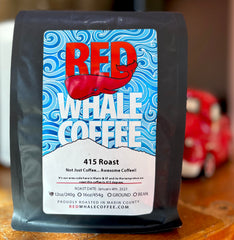Jumping through the Hoops of Organic Certification-What Organic Certification really means and does it guarantee quality? June 02, 2014
What does it mean when coffee is organic? No pesticides? Naturally-made? Yes, but that is only a small part of it. To be Certified Organic, coffee goes through an intense rigmarole at each process, starting with the soil and ending with bagging the roasted coffee.
To a farmer/producer, organic farming requires an attention to detail and constant inspections to guarantee the product, in this case coffee, is up to specifications. To be certified organic, the soil must be free of chemicals and pesticides for up to three years and the producer must use a water supply free from contamination by another farm’s chemicals. In addition, a certified organic farm cannot be too close to a farm using pesticides because wind may blow chemicals onto their crops. For many small organic producers, being certified organic is very difficult. It takes a lot of care, dedication, and money to become certified organic. As a result many small organic producers cannot survive while waiting for their coffee to become certified.
On one hand, the producer must work hard to pass inspections to ensure compliance of organic farming specifications to sell their coffee at the more expensive organic rate, and on the other hand, the farmer must work with nature and all its challenges. In most coffee producing countries there is only one coffee harvested per year. In countries like Colombia, producers can produce a main and a secondary crop. If pests infect the plant, a flood occurs, or any other elemental surprise occurs, the producer does loses that years crop and therefore, does not get paid until their next years crop.
Coffee trees naturally grow in shady forests, however some larger coffee farms now use a new type of modified coffee tree that allows them to grow in direct sunlight. A farm growing this modified coffee tree can produce far more coffee cherries without the added expense of farming the traditional shade plants that give the coffee tree its necessary shaded environment. For the organic producer, using non modified coffee trees, they have the added expense of farming not only the coffee trees but also the necessary shade trees to create the perfect environment for their unmodified plant.
In recent years, many organic producers have encountered yet another obstacle to organic farming, Roya or better known as coffee rust. Many organic producers have lost the majority of their crops after failing to battle against Roya. Rather than lose their livelihood, these once organic producers have had to farm using chemical products that eliminate the Roya disease in their farms.
But wait, it doesn’t stop there! Just because the coffee is grown organically, does not mean the final bagged product will be certified organic. Through the shipping, roasting and packaging process, everything that comes in contact with the beans must be organic and not contaminated. At each step there are inspections to certify the product continues to be handled as organic.
Red Whale Coffee focuses on the quality of coffee. Rather than buying coffee that comes with an organic certification label, we use our expertise to find coffee grown with the upmost care and attention to detail. Whether it is certified organic, grown with organic methods, or otherwise, Red Whale Coffee searches for the farms that take pride in the quality of their product. As Red Whale Coffee expands, we continue our focus on building and nurturing direct relationships with producers who grow quality coffee.
What better way to understand the conditions by which the coffee grows than to build a direct relationship with those who produce it!? You already know the roaster and now you can learn about the producers too! Discover the journey your coffee traveled before it was poured into your cup, and the humanity that had their hands in each step.
Next time you stop into Red Whale Coffee bring us all your questions on coffee farming, the people, or the process! When you hold a cup of Red Whale Coffee in your hand, know that you are a part of the coffee journey and we are excited to tell you all about it!
Written by Caitlyn Prien



